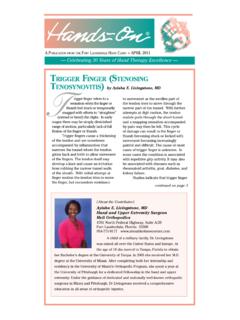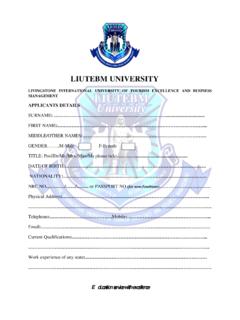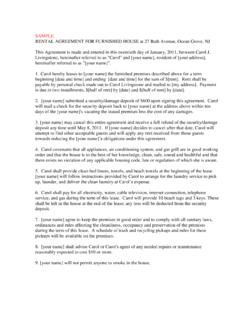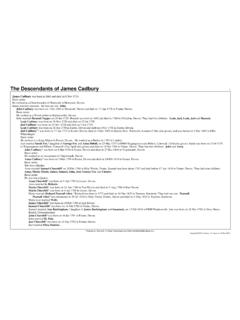Transcription of Dr. David Livingstone - World Changer Kids
1 Dr. David Livingstone Missionary Explorer in Africa (1813 1873) I am a missionary, heart and soul. God Himself had an only Son, and He was a missionary and a physician. A poor, poor imitation I am, .. but in this service I hope to live. I shall open a path into the interior [of Africa], or perish. I will place no value on anything I have or may possess, except in relation to the kingdom of Christ. My Jesus, my King, my life, my all. Once more I dedicate my whole self to Thee. Dr. David Livingstone , Missionary Explorer David Livingstone was a famous doctor, missionary, and explorer who is well known for his explorations of Southern and Central Africa. He was born on March 19, 1813 in Scotland. He grew up in a poor family and began working at the age of ten in a factory that produced cloth.
2 He worked long 12 hour days but still found time to read. He became a Christian when he was a teenager and decided at the age of 21 to become a medical missionary. He attended Anderson s College in Glasgow, Scotland, to study medicine and theology. His desire was initially to become a missionary to China. When he was 25, he heard a famous African missionary, Robert Moffat, talk about the need for missionaries in the inland of Africa where he had sometimes seen, in the morning sun, the smoke of a thousand villages, where no missionary had ever been. Moffat s plea so inspired Livingstone that he decided to dedicate his life to serving Jesus in Africa. He joined the London Missionary Society and sailed to Africa in 1840. He first started working at a mission station in South Africa called Kuruman that had been started by Robert Moffat.
3 After three years he began exploring new areas of Africa and established a second mission station called Mabotsa. While trying to help an African native attacked by a lion, Livingstone shot the lion, but during the attack his left arm was completely crushed. Being the only medical doctor available, he set the broken arm himself with no pain medicine. It took him over three months to recover from this attack. In 1845 he married Mary Moffat, Robert Moffat s daughter. They traveled together through the unexplored areas of South Africa and had six children . After eight years, Mary Livingstone and the children went to live in England. David Livingstone then began exploring parts of Central Africa and traveled along the Zambezi river until he reached the Western coast of Africa.
4 Livingstone believed that it was his calling to open Africa to Christian missions by exploring and describing the country. He thought that the Zambesi River was God s highway into the interior . Combining commerce (trade and settlement) with Christianity was the best way he thought that Africa could be penetrated with the Gospel. Travel was very difficult because of swamps, deserts, and hostile tribes. Livingstone became ill with malaria and often suffered with fever. In four years he traveled over 4,000 miles through unexplored parts of Africa. Preaching in Africa was very difficult for Livingstone , and after twelve years of labor he had only one convert to Christianity. This made him believe that the way to introduce Christianity to Africa was through exploration.
5 He became the first white man to see Lake Ngami and the magnificent waterfalls of the Zambesi River, which he named Victoria Falls after Queen Victoria of England. Natives called the falls, the smoke that thunders . In 1856 David Livingstone returned to England as a hero. There he gave many speeches and received many awards for his courageous explorations. While in England, he wrote a book called Missionary Travels and Researches in South Africa, which became an instant best seller, made Livingstone famous, and encouraged the founding of new missionary societies for Africa. He gave an inspiring message to students at Cambridge University to join the missionary movement to Africa, which resulted in the formation of the Church Missionary Union at Cambridge.
6 After one year in England, he returned to Africa for further explorations. He sent many reports back to England and throughout Europe. Livingstone was especially concerned about the slave trade that was destroying many African tribes, and his writings helped people in Europe understand the evils of slavery. Livingstone disappeared into the heart of Africa and did not see another European for seven years. Rumors arose that David Livingstone had died. A famous American newspaper, the New York Herald, sent a reporter named Henry Morton Stanley from New York to Africa to find David Livingstone . When Mr. Stanley found Livingstone in Ujiji, he said the famous greeting, Dr. Livingstone , I presume? David Livingstone continued his work in Africa until his death in 1873.
7 On May 1, 1873, Livingstone s African helpers found him dead, kneeling by his bed in a posture of prayer. At his own request, Dr. Livingstone s heart was buried in Zambia, but his body was buried in Westminster Abbey in London. He was loved and respected by African natives and people around the World . He is still known today for his explorations which opened the continent of Africa to missionaries.






